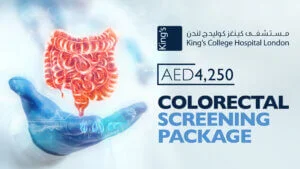
What Are Colon Polyps?
Colon polyps are small and round protrusions of tissue within the colon wall. This is a very common condition and usually harmless. However, some of these polyps can become malignant (cancerous) over time.
An advanced minimally invasive treatment called EMR (Endoscopic Mucosal Resection) for the removal of colon polyps is available in our Advanced Gastroenterology Clinic, delivered by our international expert UK visiting physician, Assoc Prof, Consultant Gastroenterologist Dr Bu’ Hayee. This is an outpatient procedure to remove polyps that avoids surgery. because there is no incision, recovery is faster, and with less pain, compared to open or laparoscopic surgery.
Colon Polyps – Symptoms
Usually, colon polyps don’t cause any symptoms. This is why having a regular screening test is so important, in order to detect and treat them in early stages. However, some people might experience the following symptoms:
- Rectal bleeding
- Change in bowel habits and stool color
- Occasional pain
- Anemia
Causes of Colon Polyps
Colon polyps can be caused either by a genetic condition or as part of the normal aging process. According to the type of mutations and cells contained in the polyps, they could be non-neoplastic or neoplastic polyps, due to their potential to generate cancer.
Some of the following factors are highly related to this condition:
- Aging
- Obesity
- Polyps family history
- Tabaco and alcohol abuse
- Personal history of inflammatory intestinal diseases
Colon Polyps Screening
There are several ways to screen for colon polyps. Some of these techniques available at King’s include:
- Colonoscopy – this is the most comprehensive way of screening for polyps. Your doctor may remove them immediately or take a biopsy (tissue sample) for testing.
- Sigmoidoscopy – Also called ‘Flexible Sigmoidoscopy, is a thin lighted tube inserted into your rectum to examine the sigmoid (this is the last 3rd of your colon) and rectum. If any polyps are found, a colonoscopy is required to remove them.
- FIT & DNA test – The fecal immunochemical test (FIT) checks for the presence of blood in your stool, or/and tests your stool DNA. If the test is positive, a colonoscopy will be required.
Colon Polyps Treatment
Due to the probability that some colon polyps can become malignant, your doctor may recommend removal of discovered polyps during an examination of your bowel. There are some different techniques, including:
- Polypectomy. Which involves the removal of the polyp with a wire loop during the colonoscopy. This procedure is the best option for small polyps (less than 1 centimeter).
- Minimally invasive surgery. In case the polyps are too large, your doctor might suggest a laparoscopic intervention to remove them. This involves making several small incisions in your skin and using minimally invasive instruments and a camera to perform the surgery
- Total colectomy. In cases of an inherited syndrome with a large number of polyps all over the colon, a total colectomy or proctocolectomy may be discussed.
Recovery and Follow-Up
Usually, recovery after a colon polyp removal via colonoscopy, polypectomy or laparoscopic surgery is relatively quick. Your doctor will make some dietary recommendations for the next few next days.
Since there is a correlation between colon polyps and colon cancer, after you have been diagnosed with colon polyps, and even if they have been properly removed, your doctor will suggest some regular follow-up screenings (through a colonoscopy) for more polyps during the coming years.
-> Back to COLORECTAL SURGERY – PROCTOLOGY
BOOK AN APPOINTMENT





